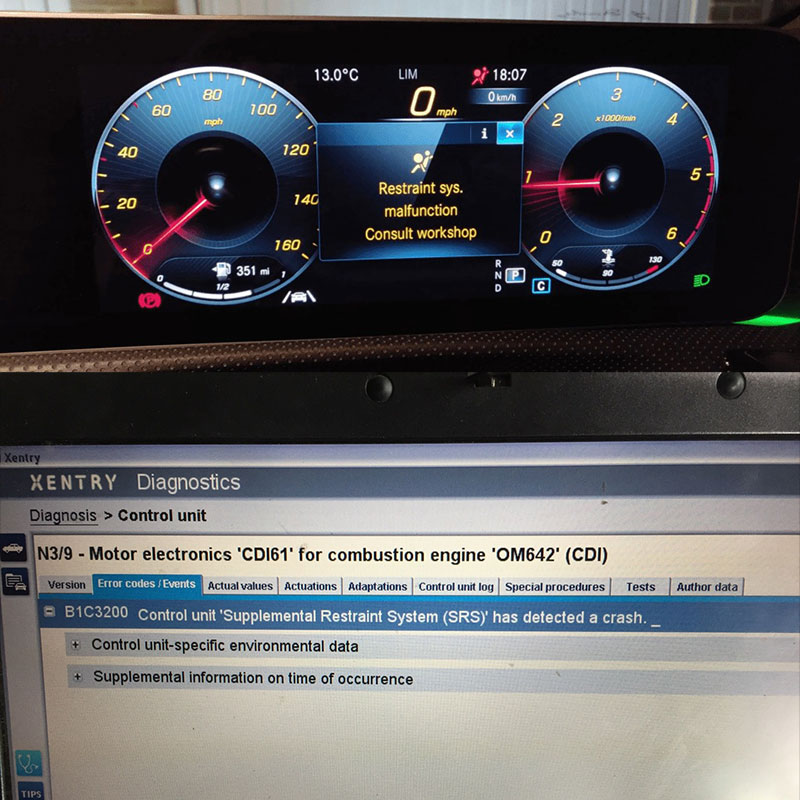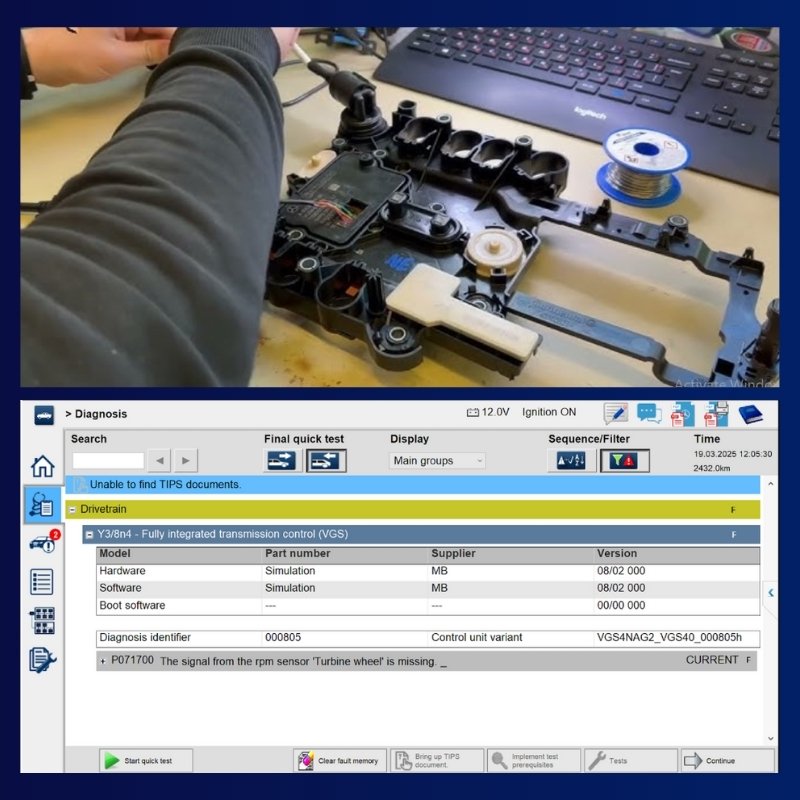
What Causes BMW Battery Data Matrix Code Errors?
Table of Content
- 1. Understanding the BMW Battery Data Matrix Code
- 1.1. What is the Purpose of the Battery Data Matrix Code?
- 1.2. Where Can You Find the Battery Data Matrix Code?
- 2. Common Causes of BMW Battery Data Matrix Code Errors
- 2.1. Incorrect Input
- 2.2. Damaged or Unreadable Code
- 2.3. Software Glitches
- 2.4. Incompatible Battery
- 2.5. Faulty Diagnostic Tools
- 3. Step-by-Step Guide to Troubleshooting BMW Battery Data Matrix Code Errors
- 3.1. Verify the Code
- 3.2. Inspect the Battery Label
- 3.3. Restart the Diagnostic Tool
- 3.4. Check Battery Compatibility
- 3.5. Software Update
- 3.6. Professional Assistance
- 4. Advanced Troubleshooting Techniques
- 4.1. ISTA+ Diagnostics
- 4.2. ECU Programming
- 4.3. Voltage Checks
- 4.4. Data Logging
- 5. Preventing Future BMW Battery Data Matrix Code Errors
- 5.1. Proper Battery Handling
- 5.2. Regular Maintenance
- 5.3. Use Quality Parts
- 5.4. Professional Installation
- 6. The Role of AutoExplain.com in Resolving BMW Battery Issues
- 6.1. Remote Diagnostics
- 6.2. Programming and Coding
- 6.3. Expert Support
- 7. Benefits of Using AutoExplain.com
- 8. Real-World Scenarios and Solutions
- 8.1. Scenario 1: Data Matrix Code Not Recognized
- 8.2. Scenario 2: Software Glitch
- 8.3. Scenario 3: Incompatible Battery
- 9. Essential Tools for Diagnosing Battery Data Matrix Code Issues
- 9.1. Diagnostic Scanners
- 9.2. Multimeters
- 9.3. Battery Load Testers
- 9.4. Barcode Scanners
- 9.5. ISTA+ Software
- 10. Frequently Asked Questions (FAQs)
- 10.1. What does the BMW battery data matrix code do?
- 10.2. Where can I find the battery data matrix code?
- 10.3. What causes data matrix code errors?
- 10.4. How can I troubleshoot these errors?
- 10.5. What if I can’t resolve the error myself?
- 10.6. Why is it important to register the battery after replacement?
- 10.7. Can I use a non-BMW battery in my BMW?
- 10.8. How often should I replace my BMW battery?
- 10.9. What are the benefits of remote diagnostic services?
- 10.10. How can AutoExplain.com help with battery issues?
- Call to Action
The Bmw Battery Data Matrix Code is crucial for proper battery registration and management in modern BMW vehicles. Are you experiencing issues with your Bmw Battery Data Matrix Code and seeking expert guidance? This article provides detailed information on diagnosing and resolving these errors, ensuring your BMW operates smoothly. With AutoExplain.com, you gain access to specialized support, enabling you to tackle even the most intricate automotive challenges swiftly and effectively.
1. Understanding the BMW Battery Data Matrix Code
The BMW battery data matrix code is a 2D barcode that contains vital information about the battery, such as its manufacturing date, capacity, and specific characteristics. This code ensures that the Battery Management System (BMS) correctly manages the battery’s charging and discharging cycles, optimizing performance and longevity.
1.1. What is the Purpose of the Battery Data Matrix Code?
The battery data matrix code serves several key functions:
- Identification: It uniquely identifies the battery, allowing the BMS to recognize the exact type of battery installed.
- Configuration: It automatically configures the BMS with the correct settings for the battery, ensuring optimal charging and discharging parameters.
- Monitoring: It enables the BMS to accurately monitor the battery’s health and performance, providing valuable data for diagnostics and maintenance.
1.2. Where Can You Find the Battery Data Matrix Code?
Typically, the battery data matrix code is located on a sticker affixed to the top or side of the battery. Look for a small, square barcode containing a series of black and white squares. You may need to remove a protective cover or label to access it.
2. Common Causes of BMW Battery Data Matrix Code Errors
Several factors can lead to errors when inputting or reading the battery data matrix code. Understanding these causes is the first step in troubleshooting the issue.
2.1. Incorrect Input
The most common cause of errors is simply entering the code incorrectly. The data matrix code contains a series of numbers and letters, and even a single mistake can cause the system to reject the input.
2.2. Damaged or Unreadable Code
If the sticker containing the data matrix code is damaged, scratched, or dirty, the system may be unable to read it. This can happen due to wear and tear, exposure to harsh chemicals, or improper handling.
2.3. Software Glitches
Sometimes, the issue may not be with the battery or the code itself, but rather with the vehicle’s software. Glitches in the BMS or diagnostic tools can cause errors during the registration process.
2.4. Incompatible Battery
If you install a battery that is not compatible with your BMW model, the system may reject the data matrix code. This is because the BMS is programmed to recognize only certain types of batteries.
2.5. Faulty Diagnostic Tools
Using outdated or faulty diagnostic tools can also lead to errors. These tools may not be able to properly read the data matrix code or communicate with the BMS.
3. Step-by-Step Guide to Troubleshooting BMW Battery Data Matrix Code Errors
When faced with a BMW battery data matrix code error, following a systematic troubleshooting approach can help you identify and resolve the issue efficiently.
3.1. Verify the Code
The first step is to double-check the data matrix code you are entering. Ensure that you are inputting the correct sequence of numbers and letters, and that you are not mistaking any characters.
- Use a Scanner: If possible, use a barcode scanner to read the data matrix code automatically. This eliminates the risk of manual input errors.
- Cross-Reference: Compare the code on the battery with the one listed on your invoice or battery documentation.
3.2. Inspect the Battery Label
Carefully examine the battery label for any signs of damage or contamination. Clean the label with a soft, dry cloth to remove any dirt or debris that may be obstructing the code.
- Lighting: Ensure that you have adequate lighting when inspecting the label. Shadows or glare can make it difficult to read the code accurately.
- Magnification: Use a magnifying glass to get a closer look at the code. This can help you identify any subtle damage or irregularities.
3.3. Restart the Diagnostic Tool
If you are using a diagnostic tool to register the battery, try restarting the tool and the vehicle. This can sometimes resolve temporary software glitches that may be causing the error.
- Updates: Make sure that your diagnostic tool has the latest software updates installed. Outdated software may not be compatible with the latest BMW models or battery types.
- Compatibility: Verify that the diagnostic tool is compatible with your BMW model and the type of battery you are installing.
3.4. Check Battery Compatibility
Ensure that the battery you are installing is compatible with your BMW model. Refer to your owner’s manual or consult with a BMW parts specialist to verify the correct battery type.
- Specifications: Pay attention to the battery’s specifications, such as voltage, capacity, and type (e.g., AGM, lead-acid). Using the wrong type of battery can cause a variety of issues, including data matrix code errors.
- BMW Parts: Whenever possible, use genuine BMW batteries. These batteries are specifically designed for BMW vehicles and are guaranteed to be compatible.
3.5. Software Update
Consider updating the vehicle’s software to the latest version. This can resolve compatibility issues and improve the overall performance of the BMS.
- BMW Dealership: The easiest way to update your vehicle’s software is to take it to a BMW dealership. They have the necessary tools and expertise to perform the update safely and efficiently.
- DIY Updates: If you are comfortable working on your car, you may be able to perform a software update yourself using a compatible diagnostic tool and software. However, this is generally not recommended unless you have extensive experience.
3.6. Professional Assistance
If you have tried all of the above steps and are still experiencing errors, it may be time to seek professional assistance. A qualified BMW technician can diagnose the issue and perform any necessary repairs or programming.
- AutoExplain.com: Contact AutoExplain.com for remote diagnostic and programming services. Our team of experienced BMW technicians can help you resolve battery data matrix code errors quickly and efficiently.
4. Advanced Troubleshooting Techniques
For more complex issues, advanced troubleshooting techniques may be required. These techniques involve using specialized diagnostic tools and software to delve deeper into the vehicle’s systems.
4.1. ISTA+ Diagnostics
ISTA+ (Integrated Service Technical Application) is the official diagnostic software used by BMW technicians. It provides a comprehensive suite of tools for diagnosing and repairing BMW vehicles.
- Error Codes: ISTA+ can read and clear error codes related to the BMS and battery registration process. This can help you identify the root cause of the data matrix code error.
- Programming: ISTA+ can also be used to reprogram the BMS with the correct settings for the new battery. This is often necessary when installing a battery with different specifications than the original.
4.2. ECU Programming
In some cases, the data matrix code error may be caused by a corrupted or outdated ECU (Engine Control Unit) program. Reprogramming the ECU with the latest software can resolve this issue.
- Specialized Tools: ECU programming requires specialized tools and expertise. It is generally not recommended for DIYers.
- AutoExplain.com: AutoExplain.com offers remote ECU programming services. Our technicians can remotely access your vehicle’s ECU and reprogram it with the latest software.
4.3. Voltage Checks
Performing voltage checks on the battery and charging system can help you identify any underlying electrical issues that may be contributing to the data matrix code error.
- Multimeter: Use a multimeter to measure the battery’s voltage. A fully charged battery should read around 12.6 volts.
- Charging System: Check the charging system voltage while the engine is running. It should be between 13.5 and 14.5 volts.
4.4. Data Logging
Data logging involves recording data from the vehicle’s sensors and systems while it is running. This data can then be analyzed to identify any anomalies or issues that may be causing the data matrix code error.
- Diagnostic Tools: Some diagnostic tools have data logging capabilities. These tools allow you to record data from various sensors and systems, such as the BMS, charging system, and ECU.
- Analysis: Analyzing the data logs can be a complex process. It often requires specialized knowledge and experience.
5. Preventing Future BMW Battery Data Matrix Code Errors
Taking proactive steps can help you prevent future BMW battery data matrix code errors.
5.1. Proper Battery Handling
Handle the battery with care to avoid damaging the label or the battery itself.
- Gloves: Wear gloves when handling the battery to protect it from dirt and oils.
- Cleanliness: Keep the battery and surrounding area clean to prevent contamination.
5.2. Regular Maintenance
Regularly inspect the battery and charging system to ensure they are in good working order.
- Visual Inspection: Check the battery terminals for corrosion and clean them as needed.
- Load Testing: Perform a load test on the battery to assess its overall health.
5.3. Use Quality Parts
Always use high-quality, genuine BMW parts when replacing the battery or any related components.
- OEM Parts: OEM (Original Equipment Manufacturer) parts are designed specifically for BMW vehicles and are guaranteed to be compatible.
- Aftermarket Parts: Be cautious when using aftermarket parts. Some aftermarket parts may not be compatible with your BMW model or may not meet BMW’s quality standards.
5.4. Professional Installation
Consider having the battery installed by a qualified BMW technician. They have the expertise and tools to ensure that the battery is properly installed and registered.
- AutoExplain.com: AutoExplain.com offers remote battery registration services. Our technicians can remotely access your vehicle and register the new battery, ensuring that the BMS is properly configured.
6. The Role of AutoExplain.com in Resolving BMW Battery Issues
AutoExplain.com offers specialized remote diagnostic, programming, and coding services designed to address and resolve BMW battery data matrix code issues efficiently. Our team of expert technicians is equipped with the latest tools and knowledge to ensure your BMW’s battery system functions optimally.
6.1. Remote Diagnostics
Our remote diagnostic services allow us to quickly identify the root cause of any battery-related issues without the need for you to bring your vehicle to a physical location. This saves you time and money while ensuring accurate diagnoses.
6.2. Programming and Coding
We provide remote programming and coding services to ensure your new battery is correctly registered with your BMW’s Battery Management System (BMS). Proper coding is essential for the battery’s longevity and performance.
6.3. Expert Support
Our team offers expert support and guidance throughout the troubleshooting and resolution process. We are available to answer your questions and provide step-by-step instructions to help you resolve any issues.
7. Benefits of Using AutoExplain.com
Choosing AutoExplain.com for your BMW battery data matrix code needs offers numerous advantages:
- Convenience: Remote services mean you don’t have to travel to a repair shop.
- Expertise: Our technicians specialize in BMW vehicles and have extensive experience with battery systems.
- Cost-Effective: Remote services are often more affordable than traditional repair shop visits.
- Time-Saving: Quick diagnosis and resolution minimize downtime for your vehicle.
- Reliability: We use the latest tools and techniques to ensure accurate and reliable results.
8. Real-World Scenarios and Solutions
To further illustrate how AutoExplain.com can assist with BMW battery data matrix code errors, let’s explore some real-world scenarios.
8.1. Scenario 1: Data Matrix Code Not Recognized
Problem: A BMW owner installs a new battery, but the car’s system does not recognize the data matrix code.
Solution:
- The owner contacts AutoExplain.com for remote diagnostics.
- Our technician remotely accesses the vehicle’s system to identify the issue.
- We determine that the data matrix code was entered incorrectly.
- The technician provides the correct code and guides the owner through the registration process.
- The battery is successfully registered, and the error is resolved.
8.2. Scenario 2: Software Glitch
Problem: A BMW technician encounters a software glitch while trying to register a new battery.
Solution:
- The technician contacts AutoExplain.com for assistance.
- Our team remotely accesses the vehicle’s system and identifies a software conflict.
- We reprogram the Battery Management System (BMS) to resolve the conflict.
- The battery is successfully registered, and the technician can continue with the repair.
8.3. Scenario 3: Incompatible Battery
Problem: A BMW owner installs an aftermarket battery that is not fully compatible with their vehicle.
Solution:
- The owner contacts AutoExplain.com for advice.
- Our technician reviews the battery specifications and determines that it is not the correct type for the vehicle.
- We recommend a compatible BMW battery and guide the owner through the replacement process.
- The new battery is correctly registered, and the vehicle’s system functions as expected.
9. Essential Tools for Diagnosing Battery Data Matrix Code Issues
Having the right tools can significantly streamline the process of diagnosing and resolving battery data matrix code issues. Here are some essential tools every BMW technician should have:
9.1. Diagnostic Scanners
A high-quality diagnostic scanner is indispensable for reading and interpreting error codes related to the battery and BMS. Advanced scanners can also perform battery registration and coding.
9.2. Multimeters
A multimeter is essential for checking battery voltage, current, and continuity. It helps in identifying electrical issues that may be contributing to the data matrix code error.
9.3. Battery Load Testers
Battery load testers assess the battery’s ability to deliver current under load. This tool helps determine if the battery is in good condition or needs replacement.
9.4. Barcode Scanners
A barcode scanner simplifies the process of reading the data matrix code. It eliminates the risk of manual input errors and speeds up the registration process.
9.5. ISTA+ Software
ISTA+ is the official diagnostic software used by BMW technicians. It provides a comprehensive suite of tools for diagnosing and repairing BMW vehicles.
10. Frequently Asked Questions (FAQs)
10.1. What does the BMW battery data matrix code do?
The BMW battery data matrix code uniquely identifies the battery, configures the BMS, and enables accurate monitoring of battery health.
10.2. Where can I find the battery data matrix code?
The code is typically located on a sticker affixed to the top or side of the battery.
10.3. What causes data matrix code errors?
Common causes include incorrect input, damaged code, software glitches, incompatible batteries, and faulty diagnostic tools.
10.4. How can I troubleshoot these errors?
Verify the code, inspect the battery label, restart the diagnostic tool, check battery compatibility, and update the vehicle’s software.
10.5. What if I can’t resolve the error myself?
Contact AutoExplain.com for remote diagnostic and programming services.
10.6. Why is it important to register the battery after replacement?
Registering the battery ensures the BMS correctly manages the battery’s charging and discharging cycles, optimizing performance and longevity.
10.7. Can I use a non-BMW battery in my BMW?
While possible, it’s recommended to use genuine BMW batteries for guaranteed compatibility and optimal performance.
10.8. How often should I replace my BMW battery?
Typically, a BMW battery should be replaced every 3-5 years, depending on usage and environmental conditions.
10.9. What are the benefits of remote diagnostic services?
Remote services offer convenience, expertise, cost-effectiveness, and time savings.
10.10. How can AutoExplain.com help with battery issues?
AutoExplain.com provides remote diagnostics, programming, coding, and expert support to resolve battery-related issues efficiently.
Experiencing a BMW battery data matrix code error can be frustrating, but with the right knowledge and tools, you can resolve the issue and get your BMW back on the road. Whether you’re a seasoned technician or a DIY enthusiast, understanding the causes and solutions outlined in this guide will help you tackle these challenges with confidence.
Call to Action
Are you struggling with a BMW battery data matrix code error or other automotive issues? Contact AutoExplain.com today for expert remote diagnostic and programming services. Our team of experienced technicians is ready to assist you.
Contact us via:
- WhatsApp: (+84)967469410
- Email: [email protected]
- Visit our website: AutoExplain.com
Our office is located at:
1500 N Grant ST Sten Denver, CO 80203
Let AutoExplain.com help you keep your BMW running smoothly.

65535 Audi Fault Code: Expert Solutions and Fixes
Audi A3 Trouble Code 00796: Diagnosis, Solutions, and Expert Insights
Audi DTC 16347:014 – Expert Diagnosis and Solutions

Josh William
Josh William is a seasoned automotive expert and technical writer at AutoExplain. With a background as an automotive technician, he brings hands-on experience and deep industry knowledge to his writing.





